*NURSING > EXAM REVIEW > CARE OF OLDER ADULTS Exam Questions with Correct Answers #SAS1-#SAS28 (300 qns) (All)
CARE OF OLDER ADULTS Exam Questions with Correct Answers #SAS1-#SAS28 (300 qns)
Document Content and Description Below
Which of the following improves attitudes toward aging and older adults? a. Staying away from older adults b. Education about older adults c. Travelling to older communities d. Watching the portra... yals of older adults in movies and on TV 2. What best describes nurses as a care provider? a. Determine client’s need b. Provide direct nursing care c. Help client recognize and cope with stressful psychological situation d. Works in combined effort with all those involved in patient’s care 3. As a student nurse, you understand that it is important to study Gerontological Nursing because: a. it is fixed and unchanging. b. it provides a way to understand the aging process and provide quality care to older adults c. it can help predict the responses that the body can do in during aging. d. it gives positive outlook to older adults. 4. Nurse Beth told Mr. Dela Cruz about ways to decrease the risk of heart disease. What role of a gerontologic nurse did Nurse Beth portray? a. Manager b. Advocate c. Teacher d. Provider of Care 5. Nurse Beth explains medical and nursing procedures to Mr. Dela Cruz’s family members. What role did Nurse Beth play in this situation? a. Manager b. Advocate c. Teacher d. Provider of Care 6. What role involves gerontological nurses being aware of current research literature, continuing to read and put into practice the results of reliable and valid studies? a. Research Consumer b. Advocate c. Teacher d. Provider of Care 7. As a nurse manager, Nurse Beth knows that she needs to develop the following skills except; a. Time management b. Assertiveness c. Staff insubordination d. Communication 8. A primary care provider’s order indicate that a consent form needs to be signed. Since the nurse was not present when the primary care provider discussed the procedure, which statement best illustrates the nurse fulfilled the client advocate role? a. “The doctor has asked that you sign this consent form.” b. “Do you have any questions about the procedure?” c. “What were you told about the procedure you are going to have?” d. “Remember that you can change your mind and cancel the procedure.” 9. A nurse who reads research articles and incorporates research findings into nursing practice would demonstrate which of the following roles? a. Collaborator b. Primary Investigator c. Producer d. Consumer 10. The nurse clarifies to a group of clients that the field of nursing interest that specializes in disease prevention, increasing autonomy and self care, and maintenance of function for older adults is a. gerontology. b. geriatrics. c. developmental psychology. d. public health. SAS#2 1. An 80-year-old patient, who lives at home with a spouse, is instructed to follow a 2 g sodium diet. The patient states, "I've always eaten the same way all my life, and I'm not going to change now." To promote optimal dietary adherence, the gerontological nurse's initial approach is to: a. inform the patient about the need to follow the diet. b. inquire about the patient's current food preferences and eating habits. c. list the variety of foods that are allowed on the diet. d. provide dietary instruction to the patient's spouse, who prepares the meals. 2. Which best describes what guides the appropriate nursing care of an aging adult? a. Evidence-based practice developed with ongoing research into the needs and outcomes of older adults b. General nursing care previously practices c. Facility policies and procedures d. Physician orders for patient complaints 3. When teaching an independent older adult patient how to self-administer insulin, the most productive approach is to: a. facilitate involvement in a small group where the skill is being taught. b. gather information about the patient's family health history. c. provide frequent, competitive skills testing to enhance learning. d. use repeated return demonstrations to promote the patient's retention of the involved tasks. 4. A 90-year-old patient comes to the clinic with a family member. During the health history, the patient is unable to respond to questions in a logical manner. The gerontological nurse's action is to: a. ask the family member to answer the questions. b. ask the same questions in a louder and lower voice. c. determine if the patient knows the name of the current president. d. rephrase the questions slightly, and slowly repeat them in a lower voice. 5. The American Nurses Association's Gerontological Nursing: Scope and Standards of Practice emphasizes: a. that abnormal responses to the aging process determine the appropriate nursing diagnoses. b. that the health status data of older adult patients be documented in a retrievable form. c. the role of the older adult patient as the sole decision maker in planning his or her care. d. the unchanging nature of the goals and plans of care for older adult patients. 6. What benefit does evidence-based practice offer clients over the age of 60? a. No actual benefits have been noted when evidence-based practice is the model for geriatric care b. Evidence-based practice offers the client improved health care in all settings c. Evidence-based practice is only used as a model in acute care settings d. Minimal changes in geriatric care have arisen from the use of evidence-based practice models 7. The lack of _______________________ can lead nurses, who care for older adult patients, to preconceptions, or bias, or prejudice in their attitudes toward their patients. e. Patient History f. Medical Knowledge g. Psychiatric Competence h. Cultural Competence 8. The five major components of a comprehensive nursing assessment of the older adult patient include which of these (choose the best answer)? a. Functional, spiritual, financial, physical, cognitive aspects b. Physical, cognitive, social, spiritual, and family aspects c. Spiritual, psychological, social, functional, and physical aspects d. Spiritual, psychological, social, functional, and financials aspects 9.In assessing the aging client, it is important for the nurse to recognize: a. The client's ability to perform ADLs b. The financial status of the client c. The job that the client held prior to aging d. All components of well-being, including biological function, psychological function, and social function 10. The nurse assessing the older population needs to have a basic understanding of which of the following? a. The economic status of the area b. The difference between normal and abnormal for the older age group c. The signs of sexual dysfunction d. The signs of cardiac disease SAS#3 1. The nurse is aware that the majority of older adults: A. Live alone B. Live in institutional settings C. Are unable to care for themselves D. Are actively involved in their community 2. Which choice best explains the practice setting for the gerontological nurse? a) In the home of the client b) Only in acute care settings c) Clinics and long-term care facilities d) Home of the client, acute care facilities, long-term care settings, and clinics or anywhere clients over the age of 65 seek health care and health education 3. A 70-year-old presents to the clinic stating that his family thinks he is losing his mind and they want to put him in a home. What would be the initial role of the gerontological nurse? a. Begin the process of finding a qualified nursing home b. Do a complete history,physical, and assessment c. Speak with the family about their concerns d. Make light of the subject until the nurse can evaluate the situation 4. An 87-year-old man, who has been living independently, is entering a nursing home. To help him adjust, the most effective action is to: a. involve him in as many activities as possible so he can meet other residents. b. move him as quickly as possible so that he does not have time to think. c. restrict family visits for the first two weeks to give him time to adjust. d. suggest that he bring his favorite things from home to make his room seem familiar. 5. Members of a family are caring for their father at home. Which statement by a family member indicates a need for teaching and caregiver instruction? a. "Dad has gotten lazy about his bathroom habits. He blames his arthritis medication for his toileting accidents." b. "Dad's room is close to the bathroom and we keep a light on for him at night." c. "It's inconvenient, but we stop other activities to remind Dad to go to the bathroom on a regular schedule." d. "We try to avoid coffee and tea at night, but Dad really likes a cup of coffee for breakfast." 6. The nurse caring for the elderly population understands that movement slows with aging. This is most likely due to: a. Cognitive function b. Changes in musculoskeletal and nervous systems c. Laziness and a feeling that life is over d. A recent change in medical condition 7. The nurse is aware that a person’s attitude about aging is influenced mainly by his or her __________. (Select all that apply.) a.life experiences b.income level c.level of education d.current age.occupation 8. What fact explains the shift of health care focus toward the older adult in the late 1960s? a.Disability was viewed as unavoidable. b.Complications from disease increased mortality. c.Older adults’ needs are similar to those of all adults. d.Preventive health care practices increased longevity. 9. Which of the following statement is true about aging? a. The majority of old people have Alzheimer’s disease. b. As people grow old, their intelligence declines significantly. c. Older adults have more trouble sleeping than younger adults. d. Personality change with age 10. In the Philippines, like other Southeastern countries, caring for the elders is part of its tradition. The following are traditions evident in the Philippines except: a. Youth customarily greets them with a gesture called mano po b. Caring for older people is the responsibility of their children. c. The dedication to family caregiving is evident in Filipino culture. d. Most of the elders are in nursing homes for proper caring. SAS#4 1. Nurse Bianca is aware that the theory of aging most likely to explain why the older population is at risk for autoimmune disorder is known as: a. cross-link theory. b. free radical theory. c. error theory. d. autoimmune theory. 2. The family member of a patient asks if vitamin C will prevent aging. In formulating an appropriate response, the nurse considers what theory? a. free radical theory. b. autoimmune theory. c. wear-and-tear theory. d. continuity theory. 3. Nurse Maria implements the concepts of the activity theory of aging when instructing the older client with osteoarthritis to: a. continue her daily walking routine. b. curtail further increases in physical activity. c. document preferred end-of-life interventions. d. avoid exposing herself to crowds. 4. The 45-year-old patient reports to the nurse he feels he is going through a "mid-life crisis." The nurse recognizes this phenomenon refers to the theory developed by which psychologist? a. Jung b. Erikson c. Newman d. Havighurst 5. The patient in the clinic tells the nurse she can "feel her biologic clock ticking." The nurse knows the patient views aging based on which theory? a. Gene theory b. Programmed theory c. Rate of living theory d. Somatic mutation theory 6. The nurse in the long term care facility who cares for primarily older adults knows these adults are in which stage of Erikson's developmental tasks? a. Trust versus mistrust b. Integrity versus despair c. Industry versus inferiority d Generativity versus stagnation e. Integrity versus despair 7. The nurse working in the long term care facility plans care based on Havighurst's theory of aging. Which task(s) should the nurse facilitate his patients to achieve? (Select all that apply.) a. Adjusting to the loss of a spouse b. Preserving and increasing strength c. Adjusting to a decrease in income d. Stabilizing one's self in one's social roles e. Looking back on one's life with pride and contentment 8. The nurse in the long term care facility frequently observes older adults being separated from their friends and family and excluded from society. This phenomenon is described in which psychosocial theory of aging? a. Activity theory b. Life-course theory c. Developmental theory d. Disengagement theory 9. The nurse is doing patient teaching for a 50-year-old woman. Based on the application of the programmed theory of aging, which brochure is the nurse most likely to offer the patient? a. "Perimenopause and Menopause: Most Frequently Asked Questions" b. "Do the Benefits Outweigh the Risks of Antioxidant Supplements?" c. "Exercise, Food, Sleep, and Fun: Healthy Lifestyle Tips for Older Adults" d. "Healthy Nutrition Is More Than Just Counting Calories and Losing Weight" 10. Two nursing students are exhausted after studying about the biologic theories of aging. They decide to have some fun and perform an action that is based on the rate of living theory. Which action do they perform? a. Go for a leisurely walk in the sunshine b. Hold their breath for as long as they can c. Share an apple and an orange d. Give each other a facial and then use anti-aging cream SAS#5 B. Multiple Choice 1. An 80-year-old female who enjoys good health explains to her primary provider that she attributed her health status to her regular intake of berries, fruit, green tea, which she states “help cleanse the damaging molecules out of my body.”Which of the following theories of aging underlies the client’s health behaviors? a. Free radical theory b. Biogerontology c. Disposable soma theory d. Cross-linking theory 2. The nurse would recognize successful aging according to Jung’s theory when a long-term care facility resident demonstrates which of the following behaviors? a. The resident takes special care to dress for dinner in a manner that pleases his tablemates. b. The resident asks permission to sit on the patio with other residents. c. The resident asks persons in his hall if his television is bothering them. d. The resident wears a large cowboy hat at all times because he likes it. 3. The nurse in the long term care facility who cares for primarily order adults knows these adults are in which stage of Erikson’s developmental tasks? a. Trust vs mistrust b. Integrity vs Despair c. Industry vs Inferiority d. Generativity vs stagnation 4. Which theory suggests that older people who have low levels of social activity have a high degree of life satisfaction? a. Activity b. Age stratification c. Disengagement d. Exchange 5. Based on the free theory of aging, what would be an appropriate behavior that might increase one’s life expectancy? a. Exercise for 45 minutes at least three times a week. b. Eat food rich in antioxidants. c. Eat a low-calorie, high protein diet. d. Do nothing. Life expectancy is determined through genetic programming. 6. Mr. Ramos, a 76-year old patient, has difficulty with social relationships and shows signs of depression. As a nurse, you know that these symptoms describe what theory? a. Functional Consequences theory b. Theory of thriving c. Theory of Successful Aging d. Nonstochastic Theories 7. Under the functional consequences theory, the following are the roles of nurses except: a. Identify contributing factors to difficulty with social relationships. b. Assess age-related changes. c. Determine biopsychosocial consequences that impact functioning. d. Design interventions that minimize age-associated disability. 8. According to Jung’s theory, which statement by an older adult indicates successful aging? a. “I have strong belief that there is life after death. So I am not afraid of dying.” b. “I never experienced travel around the world, but I traveled in my imagination.” c. “I lost my wife several years ago; I still miss her, but I focus on the good memories.” d. “Well, when I look back at my life, I am happy to say that I did it my way.” 9. Which statement describes the importance of understanding nursing theory when practicing gerontologic nursing? a. Understanding and using tested theories offer a framework on which to base nursing practice interventions b. Nursing theories are vague and do not offer substance in most health-care settings c. Theories are not proven ways on which to base nursing practice d. Theory helps identify major concepts in nursing practice and offers a framework for decision making 10. A hospital clinical educator is espousing the disengagement theory of aging when teaching staff how to best meet the needs of older clients. Which of the nurse’s teaching points best captures the disengagement theory of aging? a. “Older adults often benefit from a gradual and controlled withdrawal of their own interests from society’s interest.” b. “The disengagement between an older adult’s abilities and desires can lead to frustration and, ultimately, to illness.” c. “The lack of synchronicity between older adults’ immune systems and their environment can be root of many problems.” d. “It is imperative that we ensure older adults remain engaged with interests and events beyond themselves.” SAS#6 correct ratio. You will be given 15 minutes to answer the questions. A. Multiple Choice 1. Which is the best example of polypharmacy? a. Your patient is filling her medications at more than 1 drugstore. b. Your patient is taking more than 2 medications. c. Your patient is taking more than 9 medications. d. Your patient is taking a potentially inappropriate combination of medicines. 2. Which is the most effective method of managing polypharmacy? a. Review of medications at each office visit, to ensure an accurate med list. b. Limit your patients’ medication list to no more than 4 medicines. c. Regularly assess patient adherence to the medication regimen. d. (a) and (c) 3. Oral drugs may be absorbed less quickly in older people because: a. Of increased number of receptors in the heart b. Of increased liver metabolism c. Of increased kidney function d. Of decreased gastrointestinal motility 4. Enteric coated tablets are designed to avoid being dissolved in the highly acidic stomach. Instead, they dissolve in the intestine. Knowing this and what you know about gastrointestinal changes associated with age, what can you conclude about enteric coated tablets and older patients? a. The tablets will need to be given intravenously instead b. These tablets will probably dissolve more slowly c. The enteric coated tablets are unaffected by changes associated with age d. These tablets may dissolve more quickly 5. In an older population we can expect that drugs will be: a. Absorbed more quickly b. Metabolized more quickly c. Excreted more rapidly by the kidneys d. Excreted less readily 6. Which of the following is an age-related physiologic change that may affect the absorption of drugs? a. Xerostomia b. Faster stomach emptying c. Altered pH of the stomach contents d. Increased gastrointestinal tract motility 7. The nurse is caring for a group of older adult patients who are all receiving multiple medications. The nurse understands that it is essential to individualize each patient's therapy. Which is the best rationale for this practice? A. The percentage of drug absorbed often is decreased in older adults. B. Most older adults have decreased body fat and increased lean mass. C. Hepatic metabolism tends to increase in older adults, resulting in decreased drug levels. D. Renal function declines with age, leading to decreased drug excretion. 8. When assessing for drug effects in the older adult, which phase of pharmacokinetics is the greatest concern? A. Absorption B. Distribution C. Metabolism D. Excretion 9. All of the following are impacts of polypharmacy EXCEPT: a. Increased communication between care teams b. Adverse drug events c. Increased healthcare costs d. Medication non-adherence 10. The single most important thing we can do as healthcare providers to prevent polypharmacy is: a. Encourage our patients to carry a list of home medications in their wallet b. Tell our patient to appoint a lead doctor c. Educate our patients on each of their new medications d. Tell our patients to Google all of their medications SAS#7 A. Multiple Choice 1. You are caring for a client at the end of life. The client tells you that they are grateful for having considered and decided upon some end of life decisions and the appointments of those who they wish to make decisions for them when they are no longer able to do so. During this discussion with the client and the client’s wife, the client states that “my wife and I are legally married so I am so glad that she can automatically make all healthcare decisions on my behalf without a legal durable power of attorney when I am no longer able to do so myself” and the wife responds to this statement with, “that is not completely true. I can only make decisions for you and on your behalf when these decisions are not already documented on your advance directive.” How should you, as the nurse, respond to and address this conversation between the husband and wife and the end of life? a. You should respond to the couple by stating that only unanticipated treatments and procedures that are not included in the advance directive can be made by the legally appointed durable power of attorney for healthcare decisions. b. You should be aware of the fact that the wife of the client has a knowledge deficit relating to advance directives and durable powers of attorney for healthcare decisions and plan an educational activity to meet this learning need. c. You should be aware of the fact that the client has a knowledge deficit relating to advance directives and durable powers of attorney for healthcare decisions and plan an educational activity to meet this learning need. d. You should reinforce the wife’s belief that legally married spouses automatically serve for the other spouse’s durable power of attorney for health care decisions and [Show More]
Last updated: 1 year ago
Preview 1 out of 61 pages
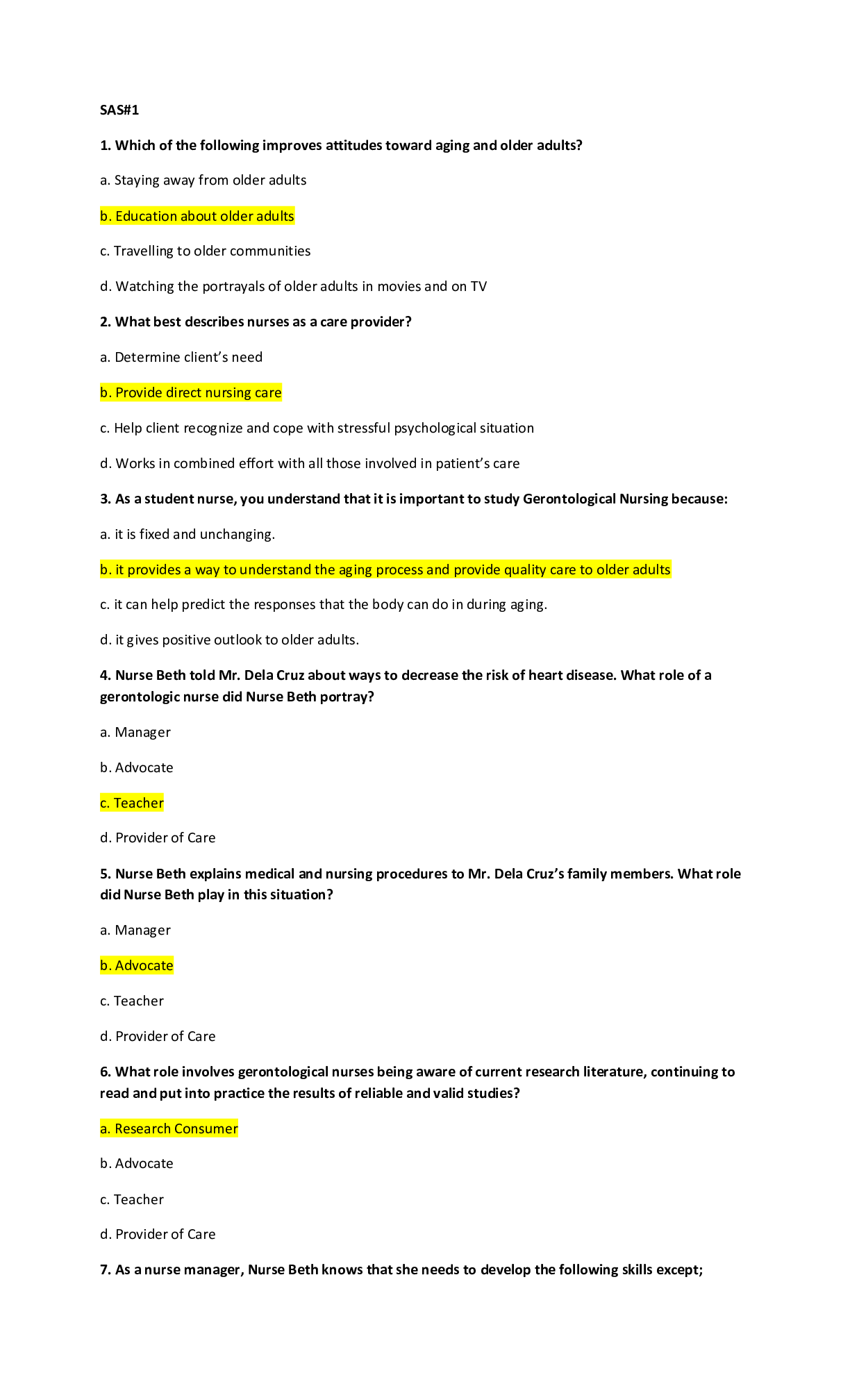
Reviews( 0 )
Recommended For You
*NURSING> EXAM REVIEW > PN 3 COMPREHENSIVE ATI Questions WITH CORRECT ANSWERS - Rasmussen College (All)
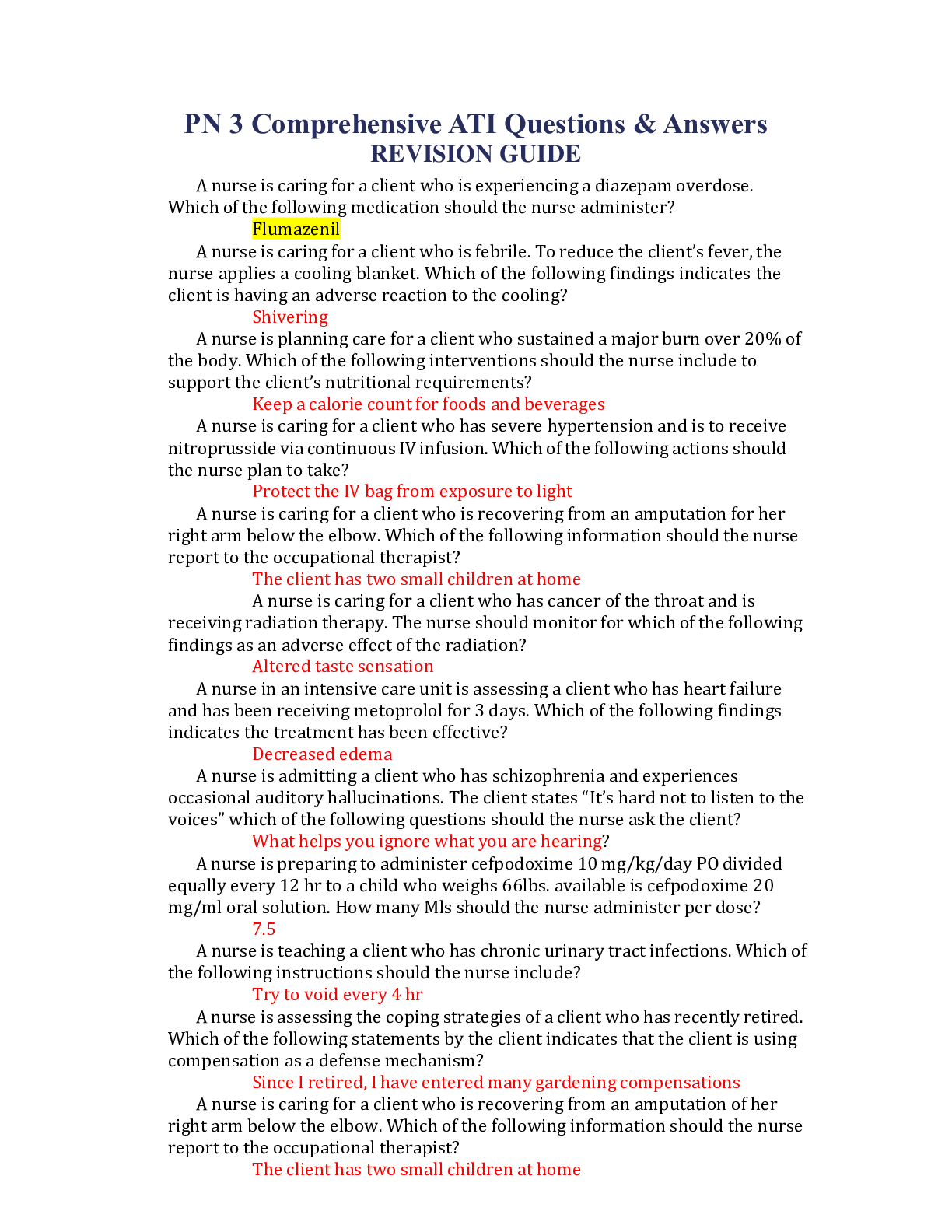
PN 3 COMPREHENSIVE ATI Questions WITH CORRECT ANSWERS - Rasmussen College
PN 3 COMPREHENSIVE ATI Questions WITH CORRECT ANSWERS - Rasmussen College
By STUDY-GUIDENOTES , Uploaded: Feb 01, 2022
$8
*NURSING> EXAM REVIEW > TNCC BUNDLE EXAMS AND STUDY QUESTIONS WITH CORRECT SOLUTIONS (All)
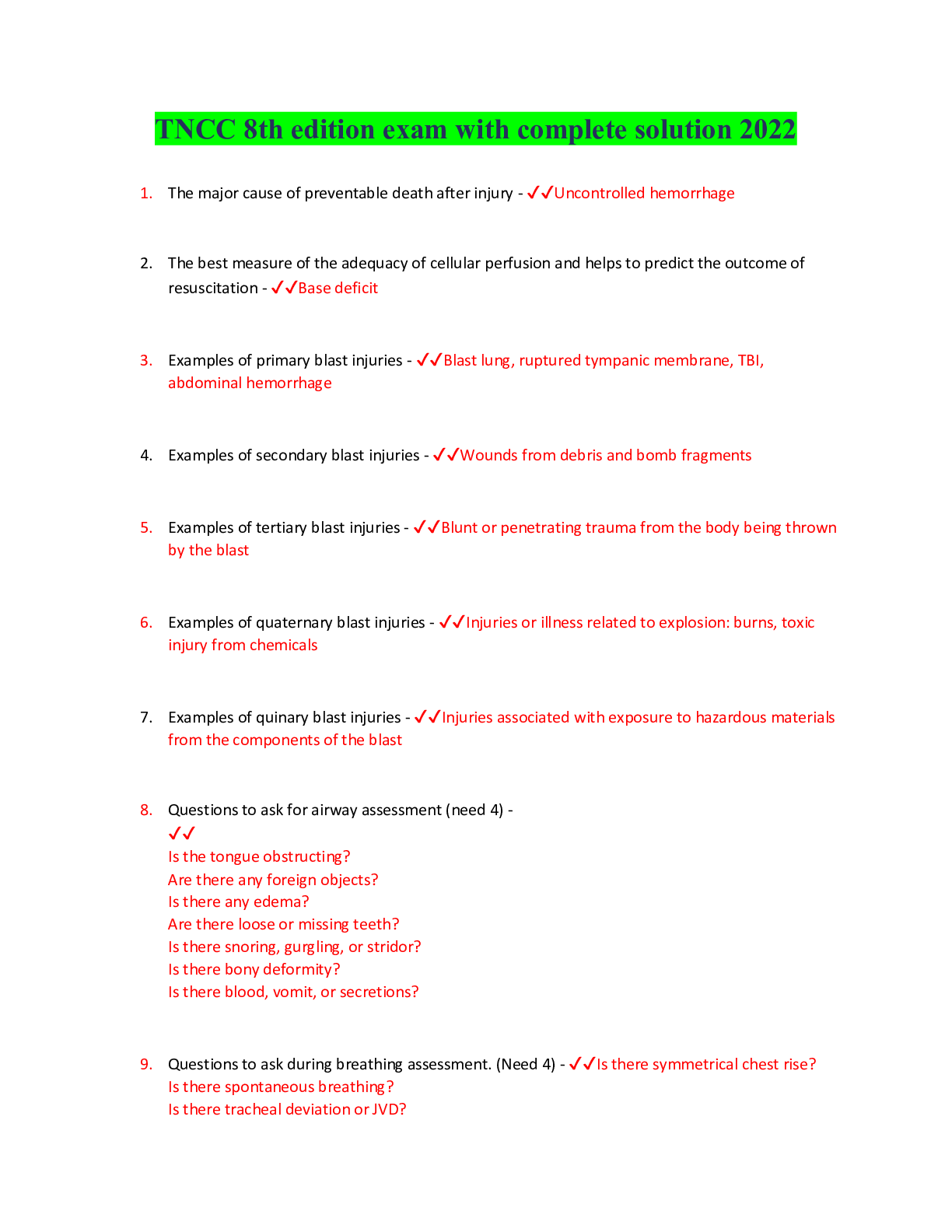
TNCC BUNDLE EXAMS AND STUDY QUESTIONS WITH CORRECT SOLUTIONS
This Bundle Contains TNCC 8th edition exam with complete solution 2022 TNCC 8th Edition Questions and Answers TNCC Final Exam Test 2022 Open Book TNCC Physical Assessments 2022TNCC test TNCC Wri...
By A-PLUS GUIDENOTES , Uploaded: Jul 25, 2022
$20
*NURSING> EXAM REVIEW > NR 503 Student Consult Questions with Correct Answers RATED A (All)
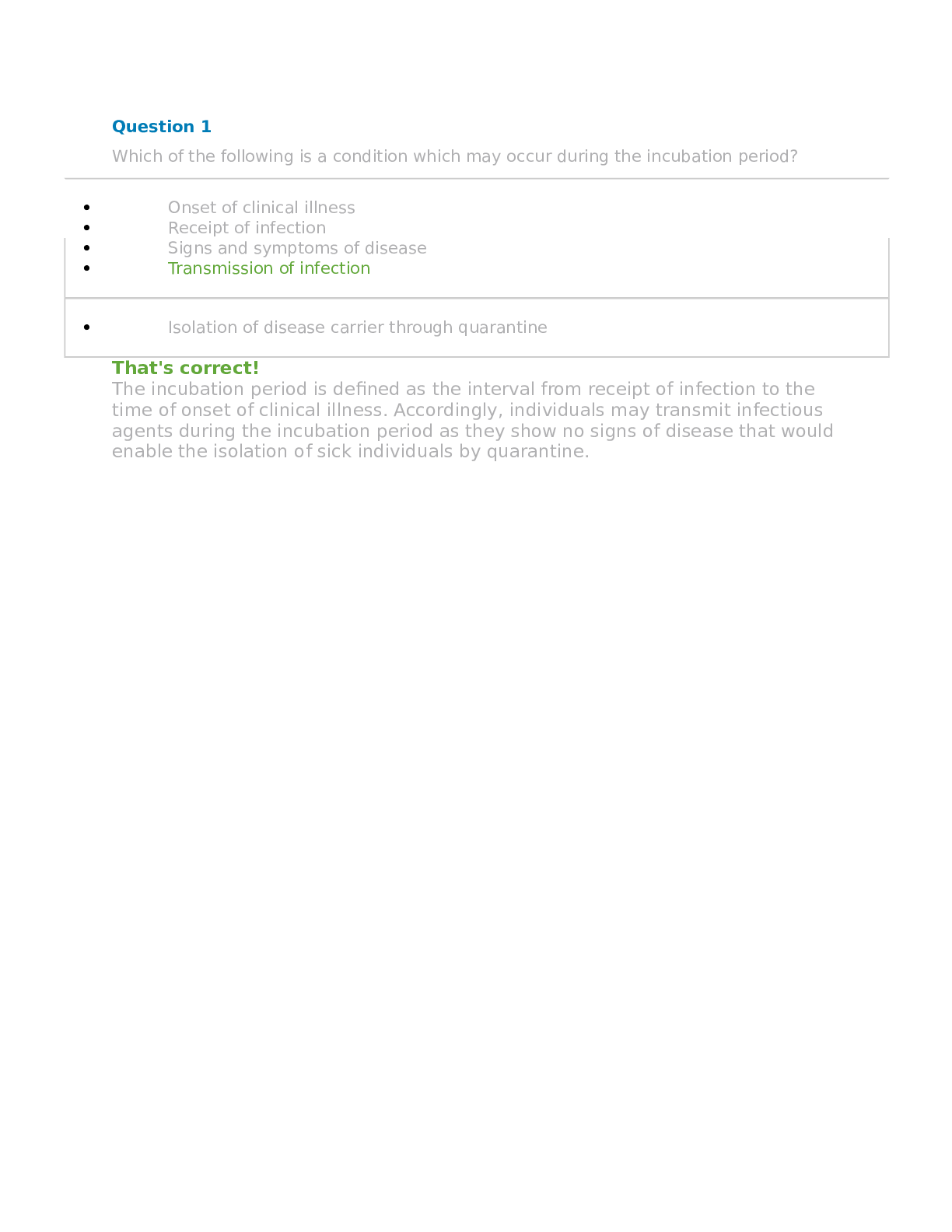
NR 503 Student Consult Questions with Correct Answers RATED A
NR 503 Student Consult Questions with Correct Answers RATED A NR 503 Student Consult Questions with Correct Answers RATED A Which of the following is a condition which may occur during the incubatio...
By Quizmaster001 , Uploaded: Sep 22, 2021
$15
*NURSING> EXAM REVIEW > NURS 3247 Pharmacology Proctored Exam Review QUESTIONS AND ANSWERS, FREQUENTLY TESTED QUESTIONS WITH CORRECT ANSWERS, (All)
.png)
NURS 3247 Pharmacology Proctored Exam Review QUESTIONS AND ANSWERS, FREQUENTLY TESTED QUESTIONS WITH CORRECT ANSWERS,
NURS 3247 Pharmacology Proctored Exam Review QUESTIONS AND ANSWERS, FREQUENTLY TESTED QUESTIONS WITH CORRECT ANSWERS, NURS 3247 Pharmacology Proctored Exam Review QUESTIONS AND ANSWERS, FREQUENTLY...
By VERIFIED A+ , Uploaded: Jul 26, 2021
$14
*NURSING> EXAM REVIEW > NR 603 Midterm APEA-reviews questions with correct answers (All)
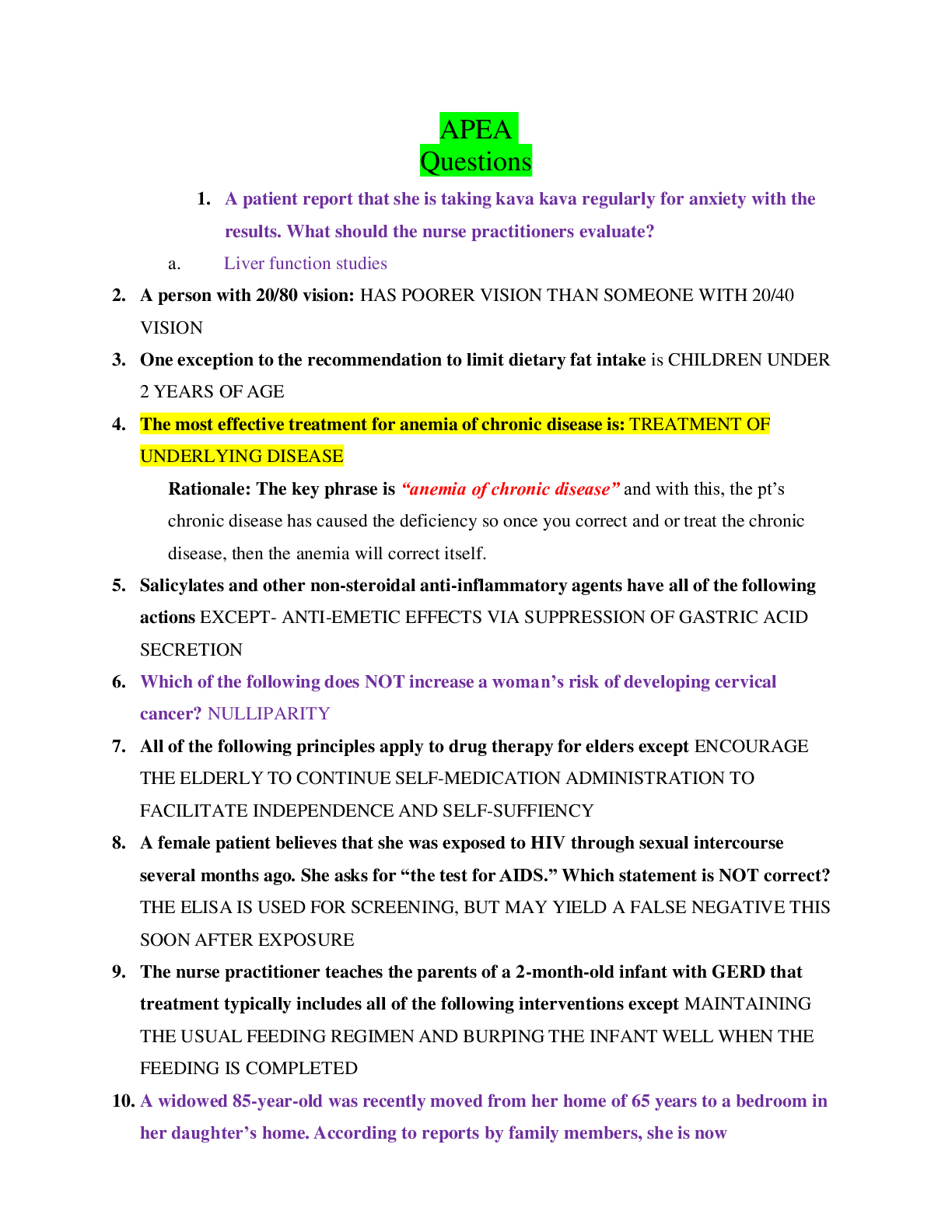
NR 603 Midterm APEA-reviews questions with correct answers
Questions 1. A patient report that she is taking kava kava regularly for anxiety with the results. What should the nurse practitioners evaluate? 2. A person with 20/80 vision: 3. One exception...
By Stuvia , Uploaded: Jul 23, 2021
$14
*NURSING> EXAM REVIEW > NR 603 Midterm APEA-reviews questions with correct answers (All)

NR 603 Midterm APEA-reviews questions with correct answers
Questions 1. A patient report that she is taking kava kava regularly for anxiety with the results. What should the nurse practitioners evaluate? 2. A person with 20/80 vision: 3. One exception...
By Best answer , Uploaded: Jul 23, 2021
$14
*NURSING> EXAM REVIEW > NR 603 Midterm APEA-reviews questions with correct answers (All)

NR 603 Midterm APEA-reviews questions with correct answers
Questions 1. A patient report that she is taking kava kava regularly for anxiety with the results. What should the nurse practitioners evaluate? 2. A person with 20/80 vision: 3. One exception...
By Anthony79 , Uploaded: Jul 23, 2021
$14
*NURSING> EXAM REVIEW > ATI PN PHARMACOLOGY EXAM REVIEW PRACTICE QUESTIONS WITH CORRECT ANSWERS (2020/2021) (All)
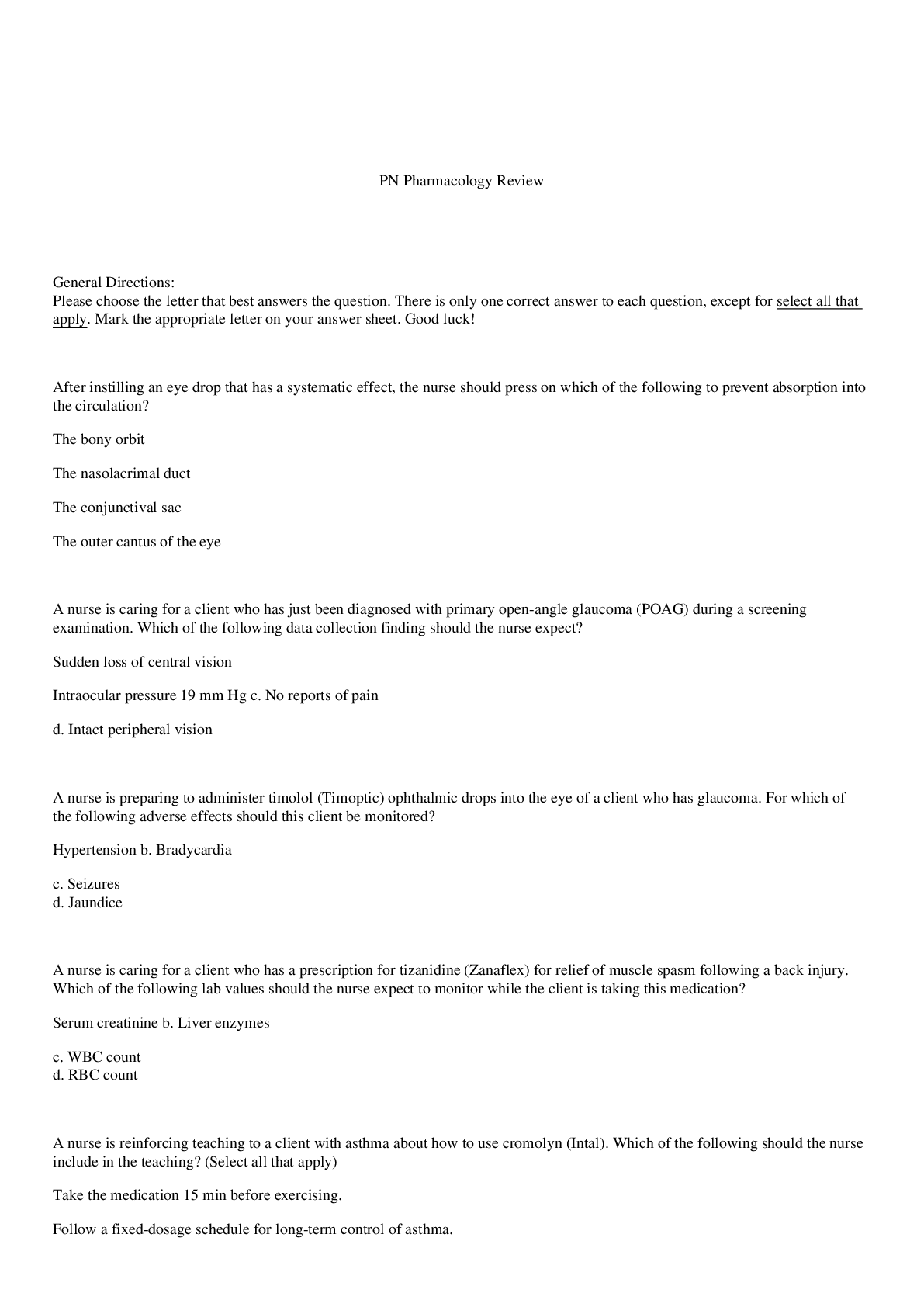
ATI PN PHARMACOLOGY EXAM REVIEW PRACTICE QUESTIONS WITH CORRECT ANSWERS (2020/2021)
ATI PN PHARMACOLOGY EXAM REVIEW WITH OVER 50 PRACTICE QUESTIONS WITH CORRECT ANSWERS (2020/2021), GRADED A+ ATI PN PHARMACOLOGY EXAM REVIEW WITH OVER 50 PRACTICE QUESTIONS WITH CORRECT ANSWERS (2020/...
By Hilda , Uploaded: Jul 19, 2021
$12
Statistics> EXAM REVIEW > week 4 quiz N2555 questions with correct answers (All)
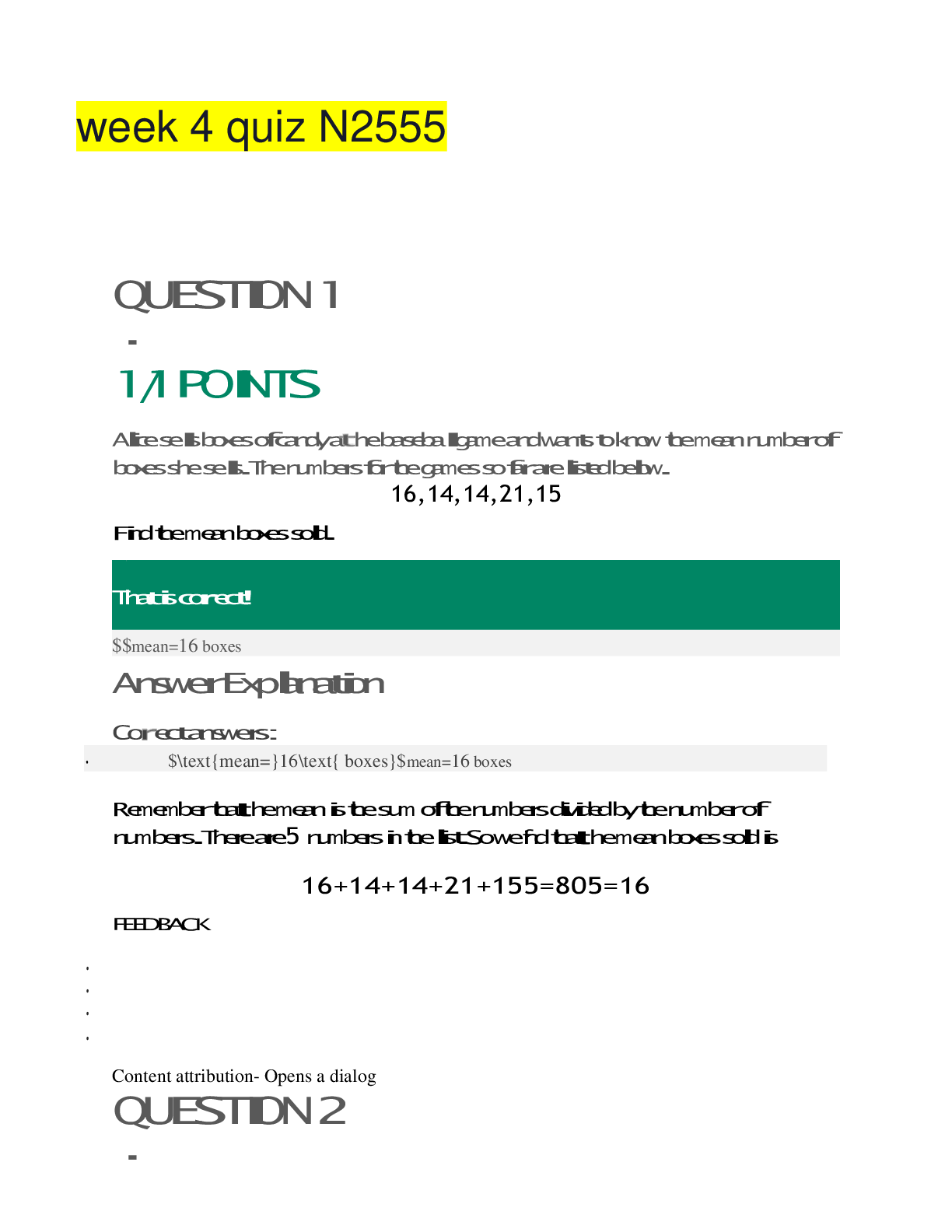
week 4 quiz N2555 questions with correct answers
week 4 quiz N2555 QUESTION1 · 1/1POINTS Aliceselsboxesofcandyathebasebalgameandwantstoknowthemeannumberof boxesshesels.Thenumbersforthegamessofararelistedbelow. 16,14,14,21,15 Findthemeanbox...
By Anthony79 , Uploaded: Jun 25, 2021
$13
Statistics> EXAM REVIEW > week 4 quiz N2555 questions with correct answers (All)

week 4 quiz N2555 questions with correct answers
week 4 quiz N2555 QUESTION1 · 1/1POINTS Aliceselsboxesofcandyathebasebalgameandwantstoknowthemeannumberof boxesshesels.Thenumbersforthegamessofararelistedbelow. 16,14,14,21,15 Findthemeanbox...
By Stuvia , Uploaded: Jun 25, 2021
$12
Document information
Connected school, study & course
About the document
Uploaded On
Nov 09, 2021
Number of pages
61
Written in
Additional information
This document has been written for:
Uploaded
Nov 09, 2021
Downloads
0
Views
202






